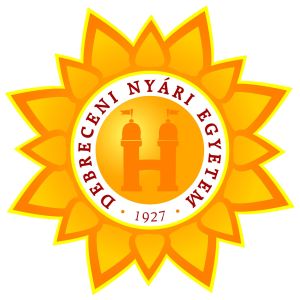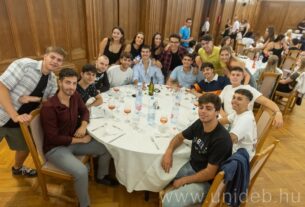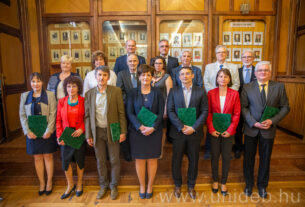Below you can read an interview with Professor John Jablonski, guest professor at the Institute of English and American Studies. The interviewer was Éva Kardos, Junior Lecturer of the Department of English Linguistics.
The Institute of English and American Studies at the University of Debrecen has had the privilege of having John Jablonski from Ferris State University (MI, USA) as a faculty member in the spring semester of 2012.
Professor Jablonski is an expert on composition theory and technical/business writing. He has taught several courses at all levels at the Institute not only in 2012 but also when he was a Senior Fulbright Lecturer in the academic year 2002-2003. He also served as Cultural Affairs Officer at the US Embassy in Budapest between 1985 and 1987.
Now that the spring semester is coming to an end, I have decided to have a conversation with Professor Jablonski about his views of Hungary and Hungarians and what he is best at, professional writing. This is our conversation.
Q: When did you first visit Hungary?
A: My first day in Hungary was November 5th, 1984. That was the day that Ronald Reagan was re-elected, unfortunately, but that’s my political bias. That’s when I was first stationed at the US Embassy in Budapest. I was here originally as what is called a Junior Officer Trainee from November until July 1985. And then I took over as a Cultural Affairs Officer.
Q: What did you think of Hungary back then?
A: I was astonished. I had been in East Berlin several times and I had been in Moscow before. I was used to people in socialist countries standing in long lines, I was used to them looking very drab, and I was used to seeing them not have access to good fruits and vegetables. And when I got here, on my second day I took a walk down Váci utca, which actually blew me away. I saw that people were not dressed in shabby clothes and I was very impressed with how friendly they were to me even though they knew I was a foreigner.
Q: Since 1984 you have visited Hungary several times. Has your perception of this country changed over time?
A: My perception of Hungarians as a people has not changed much at all. I still find them very open, friendly, particularly friendly to me here in Debrecen.
When I came back in 1993, I was surprised by the number of consumer goods that were around on the market. I started to sense that there was more economic prosperity, and yet at the same time, my Hungarian friends warned me to have a copy of my passport, to keep my briefcase close to me, to watch out for pickpockets, and that came as a shock, too. Budapest, even to this day, is nothing like New York City or Detroit as far as crime is concerned, but that was a big change that I noticed.
Q: Is there anything you have learned from us?
A: Other than your language, yes, a whole bunch of things. The first thing that comes to my mind is the sense of history that Hungarians have, much more so than in the United States. I remember hearing Henry Ford, the father of the automobile, saying that history is bunk and that the only history that matters is what a human being makes with his or her life. And I think that’s pretty much the American attitude.
My feeling whenever I come back to Hungary is this incredible sense of history: statues to people who are not just generals and soldiers, statues to poets, playwrights, and musicians. I’m always impressed by the presence of culture whether you want to define it as high culture like Beethoven’s symphonies or Kodály’s work, or just everyday culture, street musicians that I see.
Q: Is there anything you have never been able to get used to?
A: Bathtubs. I find the bathtubs too tall and too steep. Other than that I really haven’t been so alienated from the Hungarian culture. There are things in the United States which I prefer: baseball, American pizza. Those things I miss but I have not felt isolated at all in Hungary.
Q: Hungarians are often said to be very direct. Can you comment on that?
A: I absolutely agree with that. Hungarians are direct and so I don’t get into trouble the way I did in Germany because in Germany circumlocution is often expected rather than answering directly. It’s perceived as being rude. Even in the 1980s I was impressed by the fact that a Hungarian would tell me the truth and, even though we were all being watched by the other side, I did not feel many Hungarians even then held back from expressing what they really wanted to express. Another thing that I noticed different between Germany and Hungary was that Hungarians seem to like children a lot more than the Germans do. For example, I was impressed when I and my wife rode the bus, a little old Hungarian lady would grab our daughter, who was four or five years old, and put her on her lap and start talking to her. My daughter understood nothing but that impressed me.
Q: What is your most memorable experience of Hungary?
A: I’ve had so many memorable experiences. I’ll give you a bad experience first. That was in the socialist times. I was called to the consulate in our embassy because there was a man who was literally begging for an exit visa from Hungary to go to the west. He was from East Berlin and he told me that he had been imprisoned twice before for trying to leave. He also said he would be imprisoned for life if he went back. I had to explain to him that American embassies do not give exit visas for Hungary. I felt I had pretty much consigned him, although not personally, to life imprisonment. And when the Berlin Wall fell in 1989, he was the first person let go.
Now, what’s the greatest. I think it was in 1993 when I came back to Hungary after the change. I had worked very hard to foster the Fulbright program. From 1985 to 1986, when I was a Cultural Affairs Officer, we increased our exchanges between Hungary and the US from 8 to 48. When I returned in 1993, I was invited by Huba Brückner to visit the Fulbright office and I saw the brass plaque that said “Hungarian-American Fulbright Commission” and I just started to weep.

Lenke Németh and John Jablonski
Q: The University of Debrecen can be grateful to you for a number of things. This year, for instance, you have helped arrange the visit of Dr. Fritz J. Erickson, the Provost and Vice President for Academic Affairs at Ferris State University. Can you tell me about this visit?
A: It was an incredible success. This is my 21st year at Ferris and I’ve been trying through those 21 years to bring one of our higher level administrators here to see the incredible opportunities in Debrecen. And finally we have a provost who looked at the fact that there have been 10 exchanges between Debrecen and Ferris State and he decided to come and visit Debrecen. He has expressed to me that this visit exceeded his expectations and his expectations were high. And we’ve already started the balls rolling to get more people going between both places.
Q: You have taught several courses on composition theory and the rhetoric of technical/professional writing both in the United States and in Hungary. What makes a good writer and how important is it to become one?
A: A sense of audience. That’s first. And a sense of focused purpose. That seems like a very narrow thing to say, but the first three rules in writing are audience, audience, audience.
In the 1980s almost everybody who graduated with a degree in English at the Institute was going into teaching. Now almost everybody who graduates with a degree in English is not going to be a teacher. But Hungarians understand the necessity for the capacity to communicate across cultures and across borders.
Q: Technical writing is a relatively new field in Hungary. Can you tell me what your prediction is regarding the future of this field?
A: Writing for a technical audience is a very small profession but professional writing across various professions is where growth is. Forty years ago you went to any organization and executives had secretaries. That is not the case any more. More and more people have to do their own writing, their own public speaking, we just don’t have the time or the luxury of having somebody communicate for us. So what I see is that more and more people are going to be required to communicate as part of their jobs. Technical writing as a profession is divided into specialties: scientific writing, medical writing, and business writing. These are all subcategories with specific kinds of documents and specific kinds of audiences. And yet they all go back to this idea of focused purpose and audience.
I think this field is going to grow. I don’t think that most of my students are going to have a sign on their office door that says “Technical Writer” but almost everybody who is going into any profession is going to have to communicate in a world-language, which is English.
Q: Can anyone become a good writer?
A: One can become a competent writer the same way as one can become a competent piano player and that is by constant practice. And writing is one of those activities where you simply can’t be too arrogant because you are going to make mistakes, and one has to learn from mistakes and not see failure as an end but as a beginning. And it’s very hard for people to accept that odd fact, but I think that’s one of the keys that a decent writer has to understand.
I was a terrible writer when I graduated from college. What made me a better writer is trying to teach others how to write from sixth grade onto graduate school and trying to make what I considered internal external to other people in my audience. Now I’ve come to a point where I can pretty much write anything that is necessary, but it has taken many years of practice.
Q: You have also taught academic writing in our PhD programs. As a farewell message, what would be your most important advice to those who are working on their dissertations?
A: From my experience, I would say, choose the most miserably punctilious director you possibly can. In my case, my advisor accepted nothing less than my best and when it came time for my defense, nobody actually challenged my findings because of her reputation. Second, she told me everything takes longer than you think it will. The process needs time. There are going to be things that you are not expecting. Also, I would say to students writing dissertations, do not break your writing off into a reading phase and than a writing phase. Let your writing guide where your reading is going to go and where your research is going to go. Finally, never stay married to your thesis. You have to know when to give up information and when to pursue extra information.
Thank you for the interview and I wish you all the best with your future endeavors.
 John Jablonski, his wife and Gabriella Varró
John Jablonski, his wife and Gabriella Varró
John Jablonski was awarded the Pro Universitate Debreceniensis 2000 Medal by István Fábián, the Rector of the University of Debrecen on May 14, 2012.
Debrecen, 14 May, 2012.


















